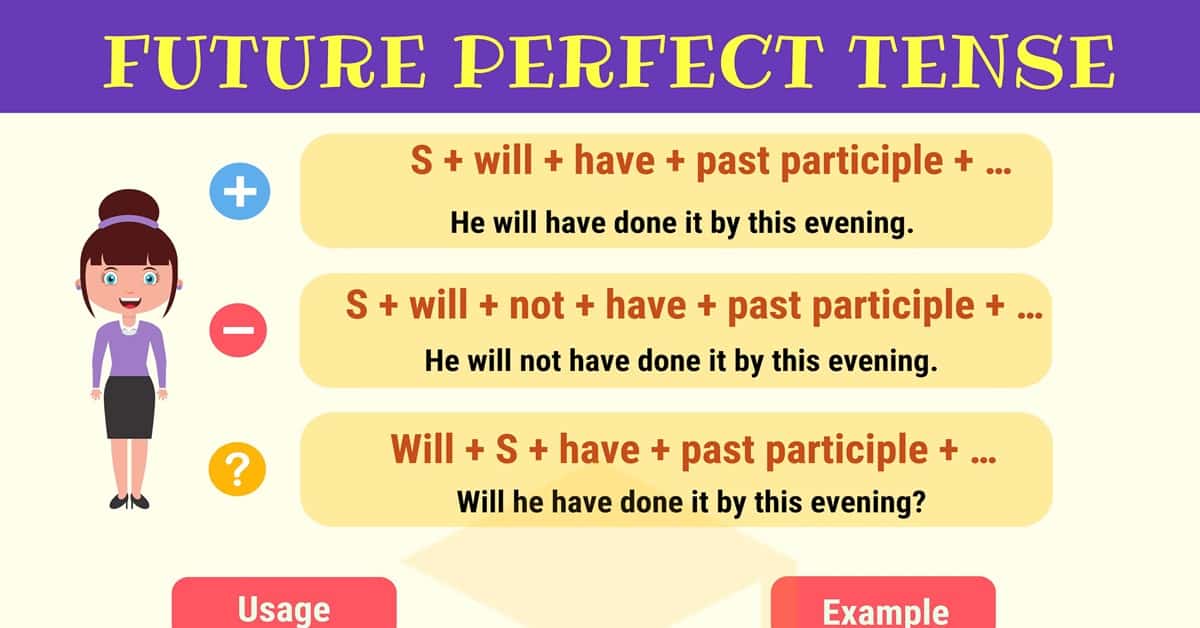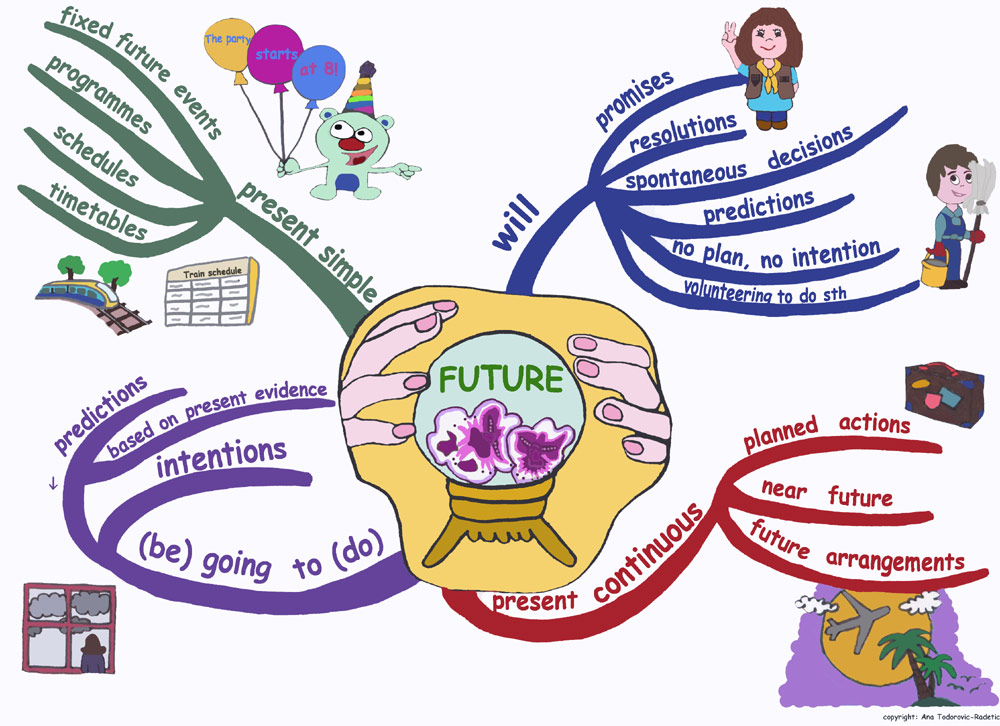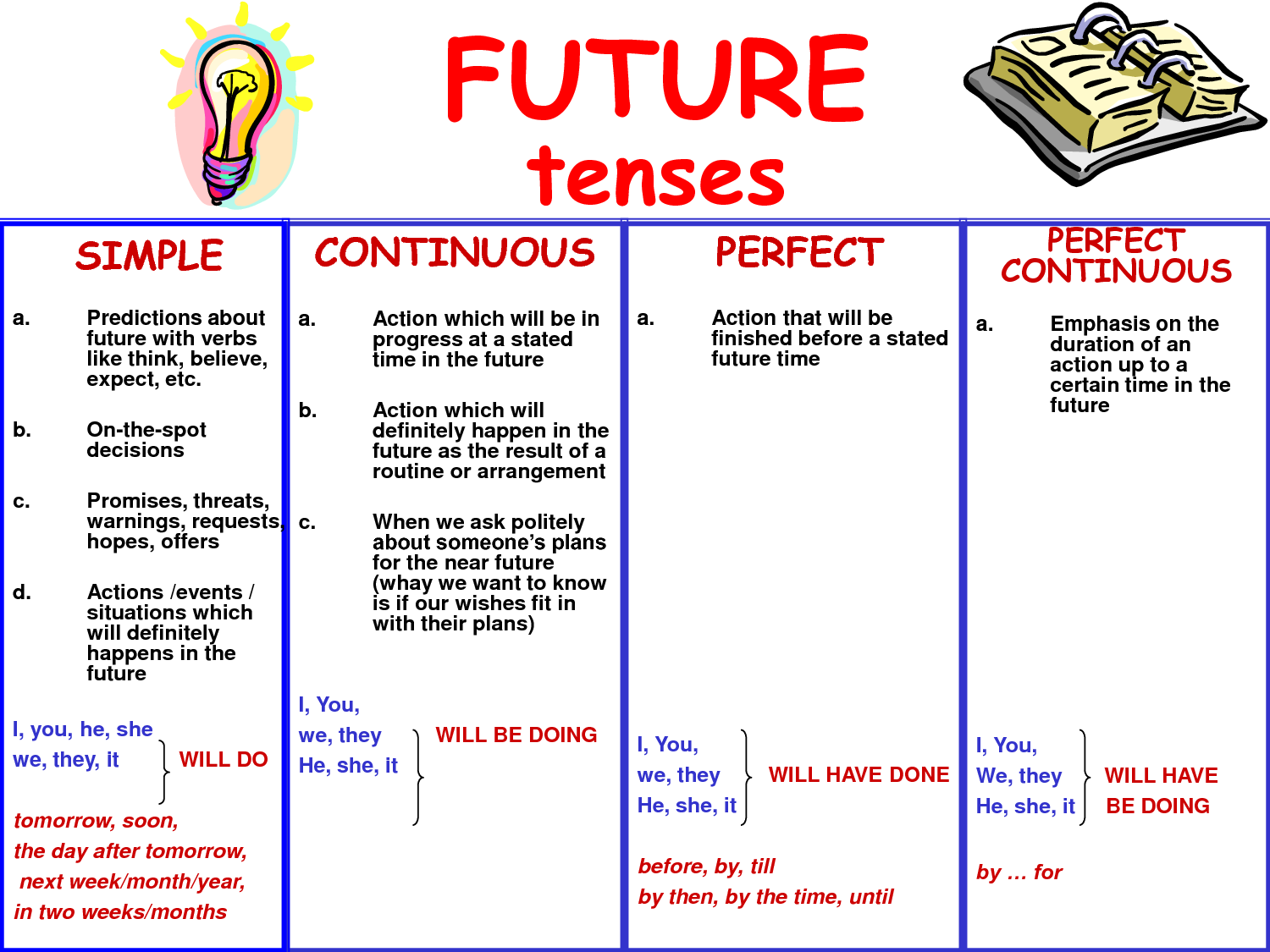
Writing In Future Tense
Future tense is a grammatical tense that is used to describe actions that will happen in the future. It is one of the twelve verb tenses in English and is used to convey information about events that have not yet occurred. In English, there are several ways to express future tense, including the use of the auxiliary verbs "will" and.

fUTURE TENSES grammar guide English ESL powerpoints
Today we're going to look at four future tenses: the future simple, the future continuous, the future perfect and the future perfect continuous. We'll show you how and when to use them. We'll also share with you some fun videos and activities to help you understand them better. Ready to learn? Let's go! The future tenses
English Teaching Corner FUTURE TENSES
Infinitive - to find Present participle - finding Past participle - found 1. Present Tense 2. Present Progressive Tense 3. Past Tense 4. Present Perfect Tense 5. Present Perfect Progressive Tense 6. Past Progressive Tense 7. Past Perfect Tense 8. Past Perfect Progressive Tense 9. Future Tense 10. Future Progressive Tense 11. Future Perfect Tense

Future Perfect and Future Perfect Continuous Tense Rules and Examples
English Grammar Verbs Talking about the future Talking about the future Level: intermediate When we know about the future, we normally use the present tense. 1. We use the present simple for something scheduled: We have a lesson next Monday. The train arrives at 6.30 in the morning. The holidays start next week. It's my birthday tomorrow. 2.

Future Tense Definition, Structures and Examples
The future tense of "find" is used to describe actions or states that will happen in the future. Here are some examples of "find" in the future tense: I will find a solution to the problem. She will find her way back home. They will find the answer soon. Irregular Verbs and Verb Forms

32 Future Simple Tense Example Sentences and Forms Affirmative Negative Interrog… English
The present progressive tense indicates that something is happening right now or is continuing to happen, or is used to talk informally about events in the near future. It uses a form of be and the present participle (i.e. the -ing form) of the main verb. Here are some verbs being all present progressive in bold: The grammarians are yodeling again.

Simple Future Tense Formula in English English Grammar Here English grammar, English verbs
finding found definition in Spanish in French in Italian Indicative Perfect tenses Continuous (progressive) and emphatic tenses Compound continuous (progressive) tenses Conditional Imperative Subjunctive *Blue letters in conjugations are irregular forms. ( example) *Red letters in conjugations are exceptions to the model. ( example)

THE FUTURE TENSES Future tense, Tenses, English
English verb conjugation TO FIND Irregular verb: find - found - found Indicative | Conditional | Imperative | Infinitive | Participle Indicative Present I find you find he find s we find you find they find Present continuous I am find ing you are find ing he is find ing we are find ing you are find ing they are find ing Preterite I found you found

Future tenses interactive worksheet for PREINTERMEDIATE in 2021 Learn english grammar, Tenses
Future Tense A Tense is a word form used to denote the time of an incident in relation to the time of speech. It denotes the end of a task or the continuation of one.

Simple future tense worksheets with answers
You/We/They found or fand ( dialectal ). Past Continuous Tense He/She/It was finding. I was finding. You/We/They were finding. Past Perfect Tense He/She/It had found or (archaic) founden. I had found or (archaic) founden. You/We/They had found or (archaic) founden. Past Perfect Continuous Tense He/She/It had been finding. I had been finding.

English VDC FUTURE TENSES
Future Tenses Most Common Irregular Verbs The two most common irregular verbs in English are "be" and "have." These pages give more details about these two verbs: the verb "to be" the verb "to have" Here are the next 10 most common irregular verbs in English: see, say, go, come, know, get, give, become, find (this page), and think

Future Tenses in English English
Learn the three forms of the English verb 'find'. the first form (V1) is 'find' used in present simple and future simple tenses. the second form (V2) is 'found' used in past simple tense. the third form (V3) is 'found' used in present perfect and past perfect tenses.

Future Tense Definition, Rules and Examples of the 04 Future Tenses • 7ESL
The Future Tense. The future can be expressed in several ways in English. Here are the different possibilities: Future Simple: will + base form of the verb. Be Going To: am, is, are + going to + base form of the verb. Shall: Shall + subject + base form of the verb? Future Progressive: will be + verbing.

English for You, Rosa´s Blog Grammar Future Tense
The future tense is a verb tense used for a future activity or a future state of being. For example: I will jump in the lake. (This is a future activity.) I will be happy. (This is a future state of being.) Table of Contents The Four Future Tenses Explained Simple Future Tense Examples of the Simple Future Tense Future Progressive Tense

E4success Future Tenses
Full conjugation of "to find" Indicative Present I find you find he/she/it finds we find you find they find Present continuous

Examples of Future Tenses What is the Future Tense? ESL Kids World
What are the rules of future tense? There are 4 types of future tenses and each one is used in a different way. Use simple future tense for actions that haven't taken place yet. Use future continuous tense for actions ongoing over a future time period. Use the future perfect tense for actions that will be finished before another point in a.